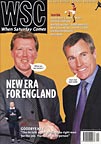 Spain's managerial strategy is non-existent, but the public hardly cares, says Phil Ball
Spain's managerial strategy is non-existent, but the public hardly cares, says Phil Ball
The Spanish national team is called La Selección, as if it magically picked itself. Maybe the name has arisen from some sort of collective wish-fulfilment, for despite the surface appearance of relative stability (only two managers in the past 19 years) the story of their footballing representatives is certainly no happier than the present English one.
As with England, managers were, and still are, recruited almost exclusively on the basis of their performance in the national league. If they did all right, be they Spanish or foreign, they could have a go. But the post never really accrued the same ministerial status it has traditionally carried in England, probably because Spain has always been more concerned with the ins-and-outs of Real Madrid and Barcelona. Consequently, the Spanish federation have always had a wider field to choose from, a relatively indifferent public and the licence to mess things up at will.
The evidence of a lack of strategy shines through most clearly in the case of Miguel Muñoz – first employed as a No 2 in 1961, taken on again for three months in 1969, and finally called to the throne after the 1982 World Cup to replace the Uruguayan José Emilio Santamaría. You might argue the case for a 20-year grooming period – after which Muñoz took the team to the Euro 84 final and the quarter-finals in Mexico two years later – or you might see him as an ageing stopgap choice who just got lucky.
Since then, the federation have been criticised more for their inertia than for making embarrassing and ill-advised choices. They certainly cannot be accused of bowing to the wind of public opinion, but then there is rarely national consensus on any issue here. A rare example was when the press began to call for Javier Clemente’s head, both before and after France 98. Clemente lasted from 1992 until 1999, when a defeat in Cyprus finally nailed his rather turbulent reign.
Clemente was a Basque and a shade too proud of it, and seemed to pick his teams with a view to provoking the ire of the Madrid-centred press. The federation had chosen him on the basis of his impressive records with Bilbao and Espanyol, but chose to overlook his Basque nationalist sympathies. The fact that he lasted so long is remarkable, especially considering his rather dour, defensive approach.
Enter José Antonio Camacho, reasonably successful so far but a man so dedicated to the art of self-defence that he barks at journalists before they’ve even taken their pencils out – he was certainly not recruited on the basis of his diplomatic skills. Try as they might, the federation cannot present his employment as a planned strategy, since he was only available because he had walked out on Real Madrid two months earlier.
But it’s really no big deal here. The national squad always wins the qualifiers, stuffing all and sundry, raises the public’s expectation then lets it down again when the real competition begins. The Spanish are resigned to this perpetual cycle, and would rather revel in the delights of their league than worry overmuch about whether the federation has mapped out its strategy for the next ten years.
Things may change, but for the moment anyway, the national neurosis levels are far lower than they are a thousand miles to the north.
From WSC 166 December 2000. What was happening this month